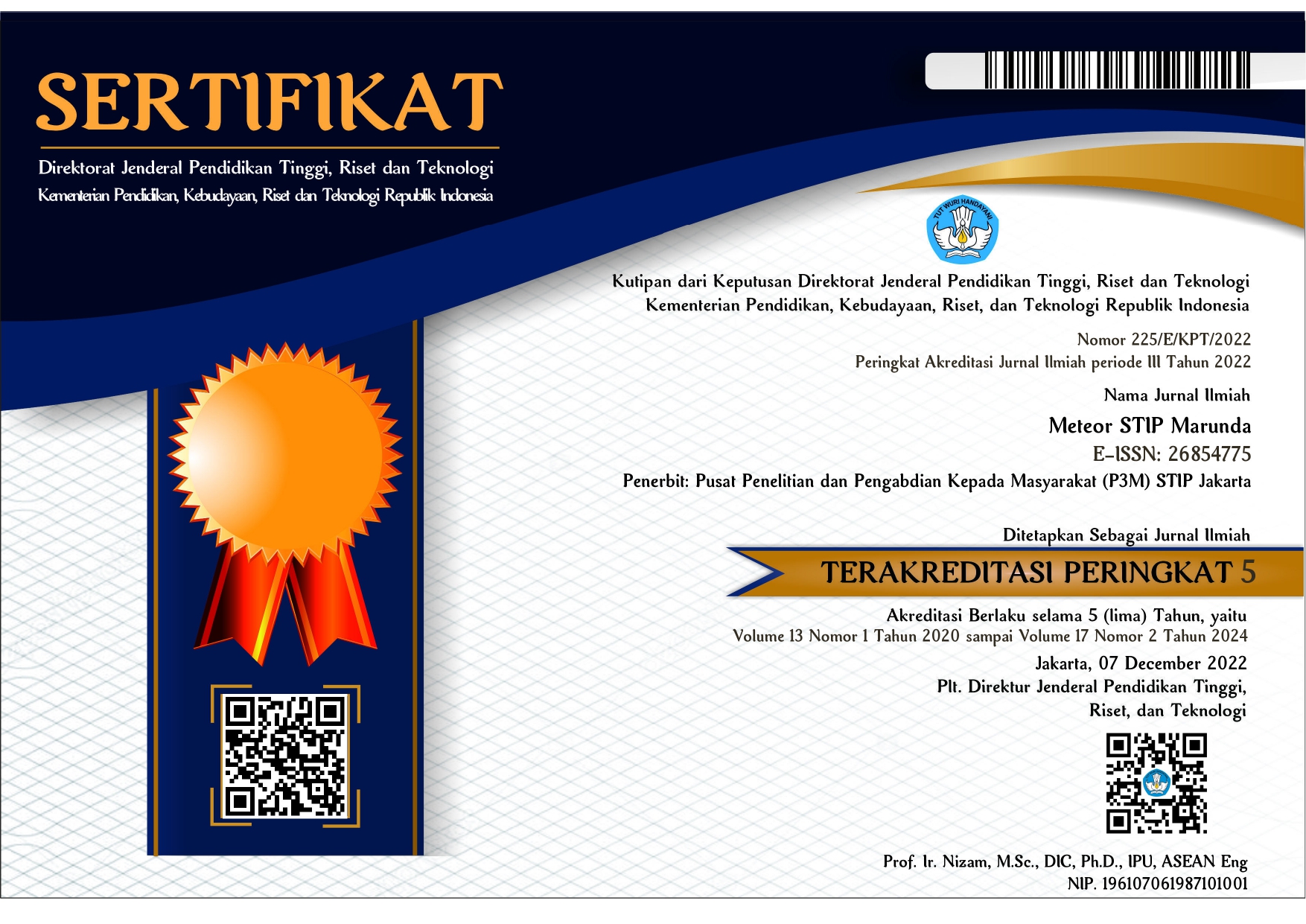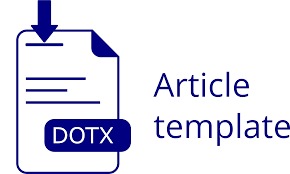THE IMPACT OF THE T-3 SEA TOLL PROGRAM ON PRICE DISPARITY
Abstract
The sea toll program is to facilitate and streamline the transportation of goods through sea transportation for logistics distribution needs in archipelagic areas that do not have good transportation. The sea toll program can provide benefits not only for price stability of basic commodities but also benefits to the regional economy. The study aims to analyze the impact of sea toll benefits on price disparities. Specifically, the research was conducted in the Tarempa area of the Sea Toll Route -Route T-3. The research used quantitative method with data analysis using the Wilcoxon method. The results of data analysis show that the sea toll program for the T3 route route shows that there is a price disparity in the need for basic goods and essential materials. Data analysis from the Asymp Sig. (2-tailed) value> 0.05, namely 0.06, so H0 is accepted, where H0 there is no difference between the price before the sea toll and after the sea toll. Research conclusions based on the price of staples according to the results of the Wilcoxon test there is no difference between before the sea highway and after the sea highway.
References
Dr. Drs. Harun Umar, M.Si (2020). "The Politics of Maritime Axis Policy", LPU, UNAS.
Wulansari, A.D. (2021). Indonesia's Cheap Wages Regime: The Political Economy of Minimum Wages Policy under Jokowi Presidency. Fudan J. Hum. Soc. Sci. 14, 417-444. https://doi.org/10.1007/s40647-021-00324-8.
Widodo, J. (2023). The New Capital is for the Future, Not for the Present Nor the Past: A Commentary on Nusantara Project. In: Warsilah, H., Mulyani, L., Nasution, I.K. (eds) Assembling Nusantara. Advances in 21st Century Human Settlements. Springer, Singapore. https://doi.org/10.1007/978-981-99-3533-8_2.
Guo, J., Lou, H., Chen, H. et al. (2023). A new detection algorithm for alien intrusion on highway. Sci Rep 13, 10667. https://doi.org/10.1038/s41598-023-37686-w.
Sameer, Y.M., Abed, A.N. & Sayl, K.N. (2023). Geomatics-based approach for highway route selection. Appl Geomat 15, 161-176. https://doi.org/10.1007/s12518-023-00495-x.
Fitria, H. (2023). Analysis of the Impact of the Sea Toll Program on the Regional Economy (Case Study: Saumlaki, Tanimbar Islands, Maluku). ITSB Journal, 4 (1): 32-38. doi: https://doi.org/10.36870/insight.v4i1.326.
Fouche, H., Herbig, F. (2023). Countering crime in Africa's maritime domain: law enforcement and environmental contamination threat intervention. WMU J Marit Affairs. https://doi.org/10.1007/s13437-023-00322-5.
Haralambides, H. (2023). The state-of-play in maritime economics and logistics research (2017-2023). Marit Econ Logist 25, 429-451. https://doi.org/10.1057/s41278-023-00265-x.
Mou, N., Wang, C., Chen, J. et al. (2021). Spatial pattern of location advantages of ports along the Maritime Silk Road. J. Geogr. Sci. 31, 149-176. https://doi.org/10.1007/s11442-021-1837-9.
Jahn, C., Weigell, J., Levina, A., Iliashenko, V. (2022). The Northern Sea Route as a Factor of Sustainable Development of the Arctic Zone. In: Ilin, I., Devezas, T., Jahn, C. (eds) Arctic Maritime Logistics. Contributions to Management Science. Springer, Cham. https://doi.org/10.1007/978-3-030-92291-7_14.
Ershaghi, I. (2023). Quantitative Methods. In: Solved Problems in Well Testing. Springer, Cham. https://doi.org/10.1007/978-3-031-47299-2_4.
Wu, Q., Glaz, J. (2024). Wilcoxon Rank Sum Scan Statistics for Continuous Data with Outliers. In: Glaz, J., Koutras, M.V. (eds) Handbook of Scan Statistics. Springer, New York, NY. https://doi.org/10.1007/978-1-4614-8414-1_67-1.
Suggestion. (2019). Quantitative, Qualitative, and R & D Research Methods. Alfabeta: Bandung.
Brocková, K., Lipková, Ľ., Osipov, V.S. (2022). Northern Sea Route as Driver of Economic Growth. In: Pak, E.V., Krivtsov, A.I., Zagrebelnaya, N.S. (eds). The Handbook of the Arctic. Palgrave Macmillan, Singapore. https://doi.org/10.1007/978-981-16-9250-5_27-1.
Jan P. M. van Tatenhove, (2023), Marine Governance as a Process of Refexive Institutionalization? Illustrated by Arctic Shipping, IDOS, https://doi.org/10.1007/978-3-031-20740-2_11.
Bilican, Mevlut Savas, Ça gatay Iris, Mumtaz Karatas (2024), A collaborative decision support framework for sustainable cargo composition in container shipping services. Annals of Operations Research, https://doi.org/10.1007/s10479-024-05827-7.
Fuady, M. S. (2023). Evaluation of Sea Toll Policy. Journal of Law, Administration, and Social Science, 3(2a), 284-293. https://doi.org/10.54957/jolas.v3i2a.628.
Kusdiana, D., Ridwan, M., & Suratman, S. S. (2024). Cheap market operations as an alternative to overcome the decline in people's economic capacity. Journal of Innovation in Community Service Results (JIPEMAS), 7(2), 305-314. https://doi.org/10.33474/jipemas.v7i2.20726.
Pepen Supendi Yusup, Muhammad Zilal Hamzah, Eleonora Sofilda, (2022), Connectivity, Design of Sea Toll Policy in Promoting Special Economic Zones, OIDA International Journal of Sustainable Development.
Lalu Tri Wijaya Nata Kusuma and Fu-Shiang Tseng, (2019), Analysis of the Impact of the “Sea Toll” Program for Seaports: Resilience and Competitiveness, Applied Sciences, https://doi.org/10.3390/app9163407.












_(1)(1).png)

